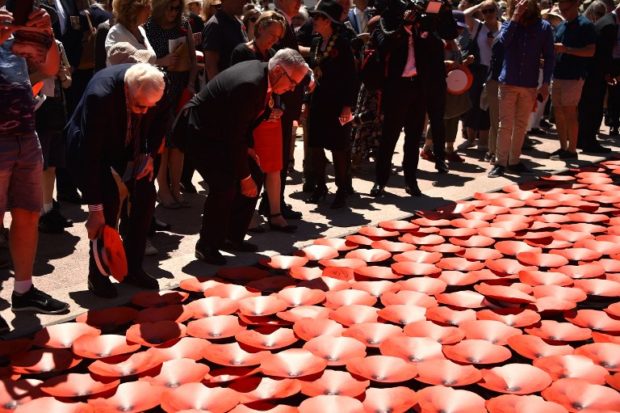Cheers, emotions as Australia and New Zealand mark WWI armistice centenary

War veterans and members of the public float giant poppies at the ANZAC war memorial in Sydney on November 11, 2018. AFP
SYDNEY, Australia — Australia and New Zealand launched global commemorations Sunday to mark the centenary of the end of World War I, combining a “roaring chorus” of peace and hope with sombre ceremonies to remember the more than 80,000 of their nationals who died in the carnage of the trenches on the other side of the world.
In moving services across Australia, huge crowds paid tribute to the servicemen and women who gave their lives in the Great War.
Prime Minister Scott Morrison spoke of their ultimate sacrifice, describing scenes of devastation at Fromelles in northern France where bodies littered the battlefield.
“For our tomorrows, they gave their today. In silence, we commit ourselves to standing by those who have returned home,” he told thousands of people gathered at the Remembrance Day national ceremony in Canberra.
Of the more than 400,000 of the young Australian federation’s citizens who enlisted, more than 300,000 served overseas and almost 62,000 died in the trenches.
Article continues after this advertisementMore than 10,000 servicemen from the Australian and New Zealand Army Corps (ANZAC) died during the abortive Gallipoli campaign on the Turkish peninsula.
Article continues after this advertisementAlthough the offensive failed in its military objectives, it gave rise to the legacy of courage and close friendship between the two countries and is regarded as a “coming of age” moment in both nations.
‘Roaring chorus’
The New Zealand commemoration followed two minutes of silence at 11:00 am on November 11, when the armistice took effect.
There was a 100-gun salute on the Wellington waterfront, while nationally people cheered, church bells rang, emergency services sounded their sirens and ship and car horns blared.
“The carillon and roaring chorus has recaptured the wave of spontaneous jubilation and hope which swept New Zealand when news of the Armistice broke,” Prime Minister Jacinda Ardern told a service at the National War Memorial in Wellington.
Thousands of people, many wearing poppies on their chests, turned out at commemorations around the country.
The June 1914 assassination of Archduke Franz Ferdinand, heir to the Austro-Hungarian throne, ignited a conflict that was contemporaneously described as “the war to end all wars”.
More than 70 million military personnel were mobilised and an estimated 10 million lost their lives.
More than 100,000 New Zealanders — about 10 percent of the population at the time — served overseas during the war, and 18,300 were killed.
“No family, no community in New Zealand went untouched by the effects of the war,” Sarah Davies, the director of the World War I centenary programme, told AFP.
“Young people have connected with people who were just like them — young men, young women who faced real hardship and either went overseas or had terrible loss. For people to re-engage with that has been critical.” /ee